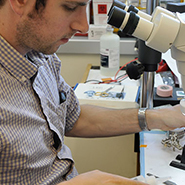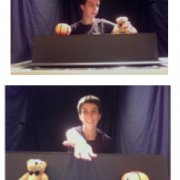One project investigates whether infants expect agents to choose actions that minimize cost in time (i.e., by choosing to reach a goal by moving on a shorter path rather than a longer one) or effort (i.e., by choosing to displace a light obstacle rather than a heavy one).
A second project investigates infants' understanding of acts of helping as instrumental actions guided by social goals. They test the hypothesis that infants first construe helping as imitation, signaling social attention but not instrumental goals.
A third project probes young infants' understanding of imitation as a social action, performed by and for social agents but not solitary agents or inanimate objects.
A fourth project investigates infants' emerging understanding of speech as conveying information about inanimate objects from one social agent to another.

 Understanding the development of intelligence in a human infant is a key project of CBMM. This project engages the fundamental tradeoff between nature and nurture, or priors and data, and ultimately the origin of priors—how constraints are selected by evolution, encoded in genes, and instantiated in genetically wired brain circuits.
Understanding the development of intelligence in a human infant is a key project of CBMM. This project engages the fundamental tradeoff between nature and nurture, or priors and data, and ultimately the origin of priors—how constraints are selected by evolution, encoded in genes, and instantiated in genetically wired brain circuits.